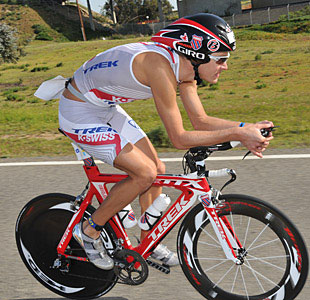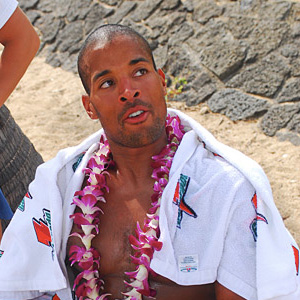Super Seal Mitch Hall talks
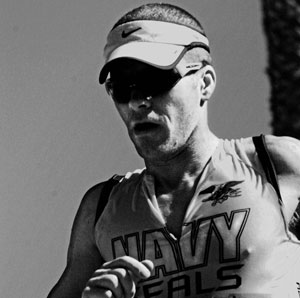
At the 2010 Rohto Ironman 70.3 California, Mitch Hall recorded the fastest age group time in 4:15:16 and placed 15th overall. Not bad for a 38-year old Navy Seal who has spent quite a bit of time in Afghanistan.
Slowtwitch: Are we catching you somehow in-between assignments?
Mitch: You’re not catching me between assignments, you’re catching me at the tail end of my career. I’m coming up on 20 years and 9 deployments and it’s time to start looking at the next chapter.
ST: I should be a bit more specific as most folks don’t know that you aren’t just another fast triathlete, but that you are a Navy SEAL.
Mitch: I am a SEAL (Sea, Air, and Land) and I have truly enjoyed my time in the SEAL Teams. It’s been very rewarding and I feel like I’ve played a tiny, yet important role in what has happened over the last 9 years.
ST: What is your exact title /rank?
Mitch: I am a Chief or E-7 in the SEAL Teams.
ST: About a year ago you were awarded a Bronze Star and a Silver Star for your actions in Iraq. So you are actually a decorated SEAL. Note: The Silver Star is the third highest combat award behind the Medal of Honor and Navy Cross.
Mitch: I received the Bronze Star in Afghanistan in 2002. It was my first of three deployments there. I was awarded the Silver Star in February of 2009, for actions during a deployment in 2007. I would gladly trade the Silver Star in exchange for my injured teammate to have his career back.
ST: You are also involved with race organization. What is your role at the Super SEAL / Super Frog (San Diego, CA) tri?
Mitch: I recently became involved with the Super Frog/ Super SEAL as the assistant race director behind Moki Martin; a retired SEAL. Moki started Super Frog 32 years ago, the proceeds go towards wounded/killed SEALS and their families, and it is the longest running half-ironman in the world. The race started as a tune-up for Hawaii in 1978 in Coronado, CA, and is 1 of only 3 ongoing triathlons for the past 30 years. More information on the race can be found at www.superfrogtriathlon.com
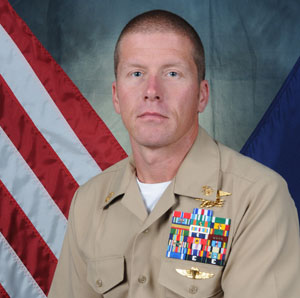
ST: So no racing for you there this year?
Mitch: No, I had my hands full with setting up transitions, marking courses, and answering every possible race question under the sun. It was eye opening to see what it takes to put on an event that requires so much coordination. I thoroughly enjoyed the event from a new perspective.
ST: You were the top age grouper at 70.3 California. Was that what you expected?
Mitch: This may sound odd, but I knew I had this type race in me. I’ve put in the work over the years and have been close to the top step of the podium before. Just not the win! Last year I had some personal life changes and I re-focused on triathlon among other things. I was more “emotionally fit”, which I think is critical when you are digging so deep at these races.
ST: It is actually not odd to have confidence, but let us talk about your race day in Oceanside.
Mitch: I felt very smooth and strong through most of the race. My power on the bike (avg 289W) was about 15-20 watts higher than usual. At one point I wondered if I was going too hard, but decided to stick with it. I was also eager to get to the run and determined to run well. This was new for me as I had been scared of T2 for the past few seasons. An overhaul of my run training last spring contributed to my newfound confidence.
ST: Which race result are you most proud about?
Mitch: Hawaii 06’ was one of the toughest experiences of my life including my career as a SEAL. I was sick with flu like symptoms the day before and woke up on race morning unsure of how I felt. As it turned out, 10 minutes into the bike leg, I knew I was done and I wasn’t racing anymore. I was in survival mode. I wanted to stop countless times, but was resolute to finish. I had no business toeing the start line that day!
ST: What should you have done instead?
Mitch: I was overly optimistic and hoped what I felt the day before had passed. While I felt better I was not "normal". I should have been patient and realized there would be more Hawaii Ironmans in my future. Of course it is hard to see when so much goes into training for the event.
ST: How often have you competed in Kona?
Mitch: I’ve been twice now (05’ and 06’). Deployments and personal obligations have since kept me away, however I will be competing this year. My original plan for this year was to take a blind athlete I’m coaching, Steve Baskis, to Kona. He was injured in Iraq about two years ago when an IED (improvised explosive device) ripped through his vehicle. We’ve postponed the idea to 2011, so I will be racing by myself this year.

ST: Which distance do you prefer?
Mitch: At this point, I prefer and excel at the 70.3. I think I’ve started to figure out how to race the 70.3 distance. It’s over faster and you can race 3 or 4 a year. I believe I’m better suited to Ironman distance racing and I’m beginning to understand racing the distance. With pacing, nutrition, and duration there are many variables to consider.
ST: What else is on your schedule this season?
Mitch: I just locked in Honu 70.3 in June, I’m on the waiting list for Vineman 70.3, and I still need to decide on a late season tune-up for Hawaii. Plus maybe the new 70.3 race in Branson, MO.
ST: Is it tough for you to plan events when you aren’t sure what your employer has in store for you?
Mitch: Yes.
ST: What does your training look like?
Mitch: I train approximately 20 hours per week and I feel my base of fitness comes from cycling. I include a tremendous amount of on the road strength work (big gear, hill repeats, big gear time trialing, and running hill repeats). I also include a modest road cycling race schedule for fun. I feel most triathletes can benefit from bike handling, tactics, and higher intensities road racing provides.
ST: How about training when you are abroad?
Mitch: When deployed, training becomes more about maintaining fitness rather than advancing it. Also, swimming is virtually impossible, but SEALs always manage to keep a high level of fitness through exercise regimes, which are easy to do in any environment.
ST: You said you were at the tail end of your career, how much time do you have left in the Navy?
Mitch: I plan to retire in September 2010, and while it is scary, I am excited about the challenges I will face as a civilian.
ST: So what are your career plans post military?
Mitch: I've started Trident Endurance Sports which will focus on race directing, coaching, camps, and youth development. I'm still working on the website and other details. I love endurance sports and will be apart of them for the rest of my life.
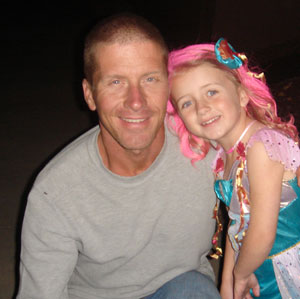
ST: Well, how did you get involved with sports in the first place?
Mitch: I grew up doing freestyle BMX, which my girlfriend finds ghetto and has a hard time believing. I recently watched a Youtube of it and I found it shocking as well.
ST: Do you follow any other sports?
Mitch: Yes, I follow pro cycling the most, but I enjoy all sports. I love the notion of competition and watching athletes push themselves. I appreciate the work that goes in to being a professional athlete. I often debate among friends the difference between sport and game. I feel sport requires speed, power, agility, sweat, physical and mental exertion. Games require an even higher percentage of mental focus than physical prowess. Oftentimes games such as golf, baseball, NASCAR do require characteristics of sports, but I still classify them as games. I bet this will spark some interesting conversation.
ST: Along the lines of sports versus games, hunters call themselves sportsmen. Which category do you think it belongs to?
Mitch: Ha! I knew this would happen. As a hunter myself I would classify hunting as more game than sport. It requires patience, tactics, timing, accuracy, and many other qualities. It typically does not require agility, power, etc. Don't get me wrong, I have a lot of respect for "games" but do note differences. The Webster dictionary would disagree with me. It's an endless yet interesting debate. Here's one, curling. Game or sport?
ST: What about eating, is that a sport? And which foods do you care for?
Mitch: I really like processed foods with hydrogenated oils and basically anything from a drive through or gas station. I like to wash it all down with tap water as I see buying bottled water is ridiculous. Yeah, I know, it’s the taste.
ST: What music do you like?
Mitch: I gravitate towards Country because I’m really sad and like trucks.
ST: What was the last book you read?
Mitch: The last book I read was something to my daughter. For myself, I blazed through “The Black Swan” by Nassim Nicholas Taleb. It’s a very interesting book about what appears to be rare events.
ST: Is there anything else we should know about you?
Mitch: I moan and twitch upon falling asleep. I hate Crest Whitestrips. I get made fun of a lot for driving in the slow lane by my girlfriend. That’s a wrap!



